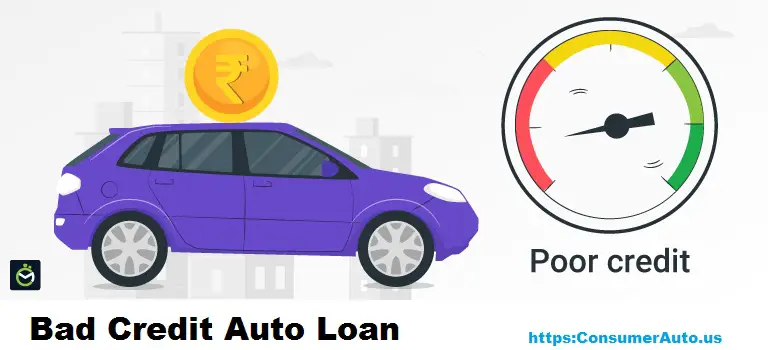Bad credit can sometimes pose challenges when it comes to securing auto credit. However, having a less-than-perfect credit history doesn’t mean you’re completely out of options.
In this article, we will explore various strategies and steps you can take to increase your chances of getting auto credit, even with bad credit.
We’ll also discuss important considerations, potential pitfalls to avoid, and alternative transportation options to explore. So,
if you’re looking to purchase a vehicle but have concerns about your credit, keep reading to find out how you can overcome this hurdle.
1. Introduction: Understanding the Concept of Bad Credit
Before we dive into the topic of getting auto credit with bad credit, it’s essential to understand what bad credit means.
Your credit history and credit score play a crucial role in determining your creditworthiness.
A credit score is a numerical representation of your creditworthiness based on various factors such as payment history, credit utilization,
length of credit history, and types of credit. When you have a low credit score, it indicates a higher risk for lenders. This is where the term “bad credit” comes into play.
2. The Importance of Credit Scores in Auto Financing
When you’re seeking auto credit, lenders typically consider your credit score to assess the level of risk involved in extending a loan to you.
A higher credit score indicates a more reliable borrower, making it easier to secure favorable loan terms and interest rates. However,
having bad credit doesn’t mean you’re automatically disqualified from obtaining auto credit. There are still options available to explore.
3. Exploring Options for Auto Credit with Bad Credit
Financing through Dealerships
Many car dealerships offer financing options for individuals with bad credit. These in-house financing options are known as “buy here, pay here” dealerships.
While they can be convenient, it’s important to thoroughly understand the terms and conditions, including interest rates and any additional fees, as they may be higher compared to traditional lenders.
Subprime Lenders
Subprime lenders specialize in providing loans to individuals with less-than-perfect credit.
These lenders are more flexible in their credit requirements but often charge higher interest rates to compensate for the increased risk. It’s
Understood. Apologies for the oversight. I’ll continue writing the article in English.
Credit Unions and Banks
Credit unions and traditional banks are also potential sources of auto credit for individuals with bad credit.
While they may have stricter requirements compared to subprime lenders, they often offer more favorable interest rates and loan terms.
It’s advisable to check with local credit unions and banks to explore these options.
Online Auto Loan Providers
The internet has opened up a vast array of opportunities for obtaining auto credit. Numerous online lenders specialize in catering to individuals with bad credit.
These lenders often have a streamlined application process and can provide quick approvals.
However, it’s crucial to research and compare different online lenders to ensure they are reputable and offer reasonable terms.
4. Steps to Improve Your Chances of Getting Auto Credit with Bad Credit
While exploring auto credit options, there are several steps you can take to improve your chances of approval:
Checking and Monitoring Your Credit Score
Start by obtaining a copy of your credit report and checking your credit score. This will give you an understanding of where you stand and what factors may be contributing to your bad credit.
Monitoring your credit regularly can help you track your progress as you work towards improving it.
Saving for a Down Payment
Having a down payment can significantly improve your chances of getting approved for an auto loan. Lenders view a down payment as a commitment on your part and a reduction in their risk.
Save up as much as possible to put towards the down payment to increase your chances of securing a loan.
Exploring Co-Signer Options
Having a co-signer with good credit can strengthen your auto credit application. A co-signer essentially guarantees the loan and is responsible for payments if you default.
Make sure to choose a co-signer who understands the responsibilities involved and is willing to support you.
Preparing Necessary Documents
When applying for auto credit, gather all the necessary documents beforehand to streamline the process. This may include proof of income, employment verification, proof of residence, and identification documents. Being prepared will demonstrate your readiness and organization to potential lenders.
5. Researching and Comparing Auto Loan Options
To make an informed decision, it’s crucial to research and compare different auto loan options available to you:
Interest Rates and Loan Terms
Different lenders may offer varying interest rates and loan terms. Compare these rates and terms to find the most favorable option for your financial situation.
Keep in mind that a lower interest rate can save you significant money over the life of the loan.
Pre-Approval and Loan Application Process
Consider getting pre-approved for an auto loan before visiting dealerships or applying online. Pre-approval gives you an estimate of the loan amount you qualify for and allows you to negotiate with more confidence.
Additionally, understand the loan application process for each lender to ensure a smooth experience.
6. Negotiating the Best Deal for Your Auto Loan
When you’re ready to secure your auto loan, it’s important to negotiate for the best possible deal:
Being Informed about Vehicle Pricing
Research the fair market value of the vehicle you intend to purchase. This knowledge empowers you to negotiate from a position of strength and ensures you don’t overpay for the car.
Considering Trade-Ins and Rebates
If you currently own a vehicle, consider trading it in as part of the transaction. This can help reduce the loan amount needed and potentially improve your loan terms.
Additionally, be aware of any available rebates or incentives that can further reduce the overall cost of the vehicle.
Negotiating Interest Rates and Loan Terms
Be prepared to provide reasons why you believe you deserve a better rate or term, such as a stable income or a significant down payment. Sometimes, lenders are willing to make adjustments based on individual circumstances
7. How to Avoid Auto Loan Scams and Predatory Lending Practices
Unfortunately, the auto financing industry is not immune to scams and predatory practices. To protect yourself, follow these guidelines:
Recognizing Red Flags
Be cautious of lenders who promise guaranteed approvals or advertise excessively low interest rates for individuals with bad credit.
These can be signs of fraudulent practices. Always trust reputable lenders and do thorough research before committing to any loan offers.
Verifying the Legitimacy of Lenders
Before providing personal information or signing any agreements, verify the legitimacy of the lender.
Check for online reviews, look for professional affiliations, and ensure the lender has a physical address and contact information.
This due diligence can help you avoid falling victim to scams.
Reading and Understanding Loan Agreements
Carefully read and understand all the terms and conditions outlined in the loan agreement.
Pay attention to the interest rate, repayment schedule, any fees or penalties, and the total cost of the loan.
If you have any doubts or questions, seek clarification from the lender before signing.
8. Understanding the Impact of Auto Loans on Credit Scores
Securing an auto loan with bad credit provides an opportunity to improve your credit score over time. Here’s how you can make the most of it:
Making Timely Payments
Consistently making on-time payments towards your auto loan is crucial. Timely payments demonstrate your reliability as a borrower and positively impact your credit score.
Set up automatic payments or reminders to ensure you never miss a payment.
Avoiding Late or Missed Payments
Late or missed payments can severely damage your credit score. If you anticipate any financial difficulties, contact your lender immediately to discuss potential solutions,
such as payment extensions or refinancing options. It’s important to address issues proactively rather than letting them negatively impact your credit.
Monitoring Credit Reports Regularly
Regularly monitor your credit reports to ensure accuracy and identify any potential errors or fraudulent activities.
By staying vigilant, you can take prompt action to rectify any issues and protect your credit standing.
9. Exploring Alternative Transportation Options
If obtaining auto credit proves challenging, there are alternative transportation options to consider:
Carpooling and Ridesharing
Consider carpooling with colleagues, friends, or family members who commute in the same direction.
Sharing the cost of transportation can significantly reduce expenses and alleviate the need for a personal vehicle.
Public Transportation
Utilize public transportation networks available in your area. Buses, trains, or trams can provide cost-effective transportation solutions, especially for daily commuting needs.
Leasing or Renting Vehicles
Leasing or renting a vehicle can be a viable short-term option if you need a car for specific occasions or a limited period.
This can provide flexibility without the long-term commitment of an auto loan.
10. Conclusion
While bad credit may present challenges in obtaining auto credit, it doesn’t mean you’re completely out of options.
By understanding the concept of bad credit, exploring different financing options, and taking proactive steps to improve your creditworthiness,
you can increase your chances of securing auto credit. Remember to research, negotiate, and be vigilant against scams and predatory practices.
Additionally, consider alternative transportation options if necessary. With perseverance and careful financial management, you can overcome bad credit and drive away in the vehicle you need.
FAQ :
1. Can I get auto credit with bad credit?
Yes, it is possible to get auto credit even with bad credit. There are various lenders, including dealerships, subprime lenders, credit unions, and online providers, who specialize in offering auto loans to individuals with less-than-perfect credit.
2. Will having bad credit affect the interest rate on my auto loan?
Yes, having bad credit can result in higher interest rates compared to borrowers with good credit. Lenders view bad credit as an increased risk, and to offset this risk, they may charge higher interest rates. However, by improving your credit over time, you can refinance your loan to potentially obtain a better interest rate.
3. Can a co-signer help me get auto credit with bad credit?
Having a co-signer with good credit can significantly improve your chances of getting approved for an auto loan. A co-signer essentially guarantees the loan and shares the responsibility for repayment. Their good credit history provides added assurance to the lender, making it more likely for you to secure the loan.
4. How can I avoid falling victim to auto loan scams?
To avoid scams, it’s crucial to research and choose reputable lenders. Be wary of lenders who guarantee approvals or offer exceptionally low interest rates to individuals with bad credit. Verify the legitimacy of the lender by checking online reviews and ensuring they have a physical address and contact information.
5. How can I improve my credit score while repaying my auto loan?
Making timely payments on your auto loan is one of the most effective ways to improve your credit score. Consistently paying on time demonstrates your reliability as a borrower. Additionally, continue managing your other debts responsibly, keep your credit utilization low, and avoid applying for new credit while repaying the auto loan.
Remember, while obtaining auto credit with bad credit may require some extra effort, it is possible to secure a loan and work towards improving your credit over time.







